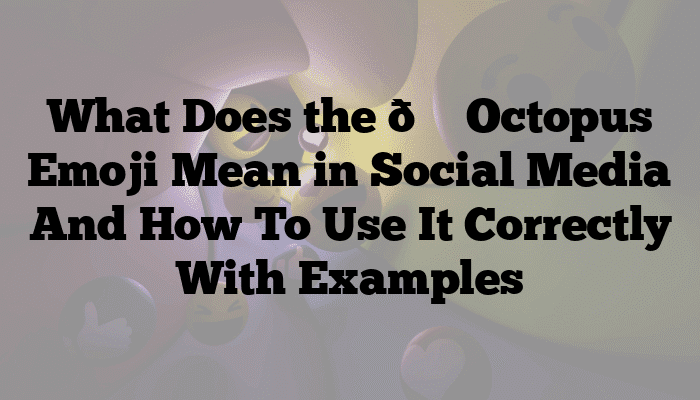The 🍇 grape emoji is commonly used on social media to represent grapes, food, wine, and a range of related concepts. It can be used to express appreciation for wine, cravings for grapes, or even to symbolize abundance and fertility.
For example, someone might use the grape emoji in a post about enjoying a glass of wine or in a comment expressing their love for grapes. Overall, the grape emoji adds a touch of flavor and fun to conversations about food, wine, and indulgence on social media platforms.
Understanding The Symbolism
The grape emoji, 🍇, carries symbolism in social media that represents luxurious indulgence, fertility, and abundance. To use it correctly, include it in posts about wine, vineyards, or celebrations to convey a sense of opulence and plenty. For example, use it alongside a photo of a lavish feast or a bottle of fine wine to enhance the message of abundance and enjoyment.
Positive Symbolism Of The 🍇 Grape Emoji
The 🍇 grape emoji, often depicted as a bunch of purple grapes, carries various positive symbolism in social media. From its association with abundance and prosperity to its representation of indulgence and pleasure, this fruity symbol adds a delightful touch to your online communication.
Here are some examples of how to use the 🍇 grape emoji correctly:
- Sharing good news: “Just got a promotion at work! 🍇”
- Celebrating success: “Finally crossed off everything from my to-do list today! Time to relax with some wine and 🍇”
- Expressing satisfaction: “That concert last night was amazing! The music, the atmosphere, everything was 🍇”
- Enjoying the finer things in life: “Indulging in a luxurious spa day. 🍇 Treat yourself!”
Negative Symbolism Of The 🍇 Grape Emoji
While the 🍇 grape emoji is commonly associated with positive connotations, it can also carry negative symbolism in certain contexts. It’s important to use this emoji wisely to avoid any misunderstandings or unintended implications.
Here are some examples of when using the 🍇 grape emoji may not be suitable:
- Restrictive diets: If you’re promoting a healthy eating lifestyle or discussing a restrictive diet, using the 🍇 grape emoji may contradict your message.
- Alcohol addiction: In discussions about alcohol addiction or recovery, the use of the 🍇 grape emoji may trivialize the seriousness of the issue or potentially trigger individuals.
- Serious topics: When engaging in serious discussions or sensitive conversations, it’s generally advisable to refrain from using playful emojis like the 🍇 grape.
It’s essential to maintain a thoughtful approach to emoji usage in social media, ensuring that the meaning and implications align with your intended message.
Proper Usage And Examples
When it comes to using the 🍇 grape emoji in social media, it’s essential to understand its proper usage to ensure effective communication. Here, we will explore different contexts where the grape emoji can be used, along with examples, to help you convey your message accurately.
Using The 🍇 Grape Emoji To Indicate Food And Beverages
The 🍇 grape emoji is commonly used to represent food and beverages related to grapes. It can be utilized in various contexts, such as:
- Sharing a delicious grape salad recipe: “Just made this refreshing 🍇 grape salad with honey and walnuts. Perfect for a summer day!”
- Expressing satisfaction with a wine choice: “Finally got my hands on a bottle of that rare vintage Cabernet Sauvignon 🍇. It was worth the wait!”
Using The 🍇 Grape Emoji To Symbolize Success And Achievement
In the realm of success and achievement, the 🍇 grape emoji can be utilized to reflect accomplishment or reaching a milestone. Here are a couple of examples:
- Announcing a promotion at work: “Exciting news! After months of hard work, I have been promoted to team lead 🍇. Cheers to the future!”
- Celebrating a personal achievement: “I just finished writing my first book 🍇. It’s a dream come true for any aspiring author!”
Using The 🍇 Grape Emoji To Express Disappointment Or Frustration
When you want to express disappointment or frustration, the 🍇 grape emoji can help convey your feelings. Consider the following examples:
- Feeling let down: “I can’t believe my favorite band canceled their concert 🍇. I was really looking forward to it.”
- Expressing frustration about a delayed delivery: “Ordered my package a week ago, and it still hasn’t arrived 🍇. The wait is driving me crazy!”
Using The 🍇 Grape Emoji In A Playful Or Flirtatious Manner
The 🍇 grape emoji can also be employed in a playful or flirtatious manner, adding a touch of fun and excitement to your conversation. These examples can give you some inspiration:
- Teasing someone in a playful way: “You’re such a grape🍇! Always finding ways to make me laugh.”
- Flirting with a hint of playfulness: “You looked like a fine 🍇 grape in that outfit. Can’t help but be attracted to you!”
By using the 🍇 grape emoji correctly and in various contexts, you can enhance your social media communications, making them more engaging and expressive. Remember, emojis are a powerful tool for conveying emotions and adding depth to your messages. Use them wisely to connect with your audience effectively.
Conclusion
To sum up, the 🍇 grape emoji is a versatile symbol with various meanings in social media. It can represent anything from a fruity treat to a symbol of good fortune or even an invitation to relax. By understanding its context and using it correctly, you can effectively communicate your message and add a touch of visual appeal to your posts.
So go ahead and give the grape emoji a try in your social media messages, and let your creativity shine through. Happy emoji-ing!
